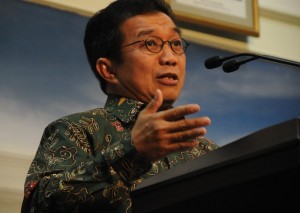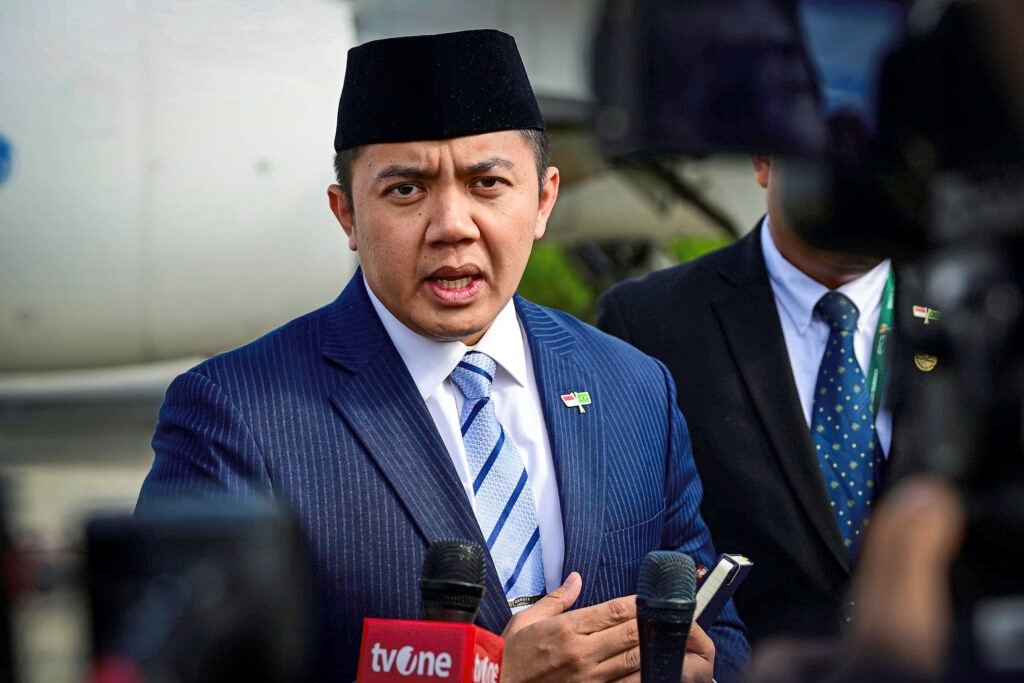Here are Six Deregulation Policy Packages on Finance Service Sector

Financial Services Authority (OJK) Chairman Muliaman Hadad announced 6 Deregulation Policy Packages on Finance Service Sector, at the Presidential Office, Jakarta, on Wednesday (7/10) afternoon
Along with the launching of the Third Economy Package at the Presidential Office, Jakarta, on Wednesday (7/10), the Chairman of Financial Services Authority (OJK) Muliaman D. Hadad also announced Six Deregulation Policy Package on Finance Service Sector.
According to Muliaman, the six Deregulation Policy Package on Finance Service Sector are: 1. related to easing business requirements of foreign currencys deposit and management 2. related to the launching of scheme of agricultural insurance; 3. revitalization of venture capital industry; 4. Establishing a consortium of industrial financing which is oriented in export, creative industry, as well as micro, small medium-sized business and cooperatives; 5. empowering Indonesian export institution; and 6. implementing the one project concept to set the quality of credit.
I hope it would bring benefit in the future. I am probably quite detail, but not extremely detail oriented. I will take the main policies only, Muliaman said.
Foreign Currency Deposit
In term of easing the requirements for the business of foreign currencys deposit and management carried out by banks, or called business trust, the bank will act as a trustee. According to Muliaman Hadad, in order to support advanced stimulus policy and to boost banks capability in managing foreign currency, OJK took some measures too ease the requirements for the general public and branch office of foreign banks could deposit and manage foreign currency or business trust in national banks.
The Chairman of OJK explained that generally there are several initiatives regarding this matter, particularly in the changing items, which is expanding the number of banks. It means that it is not limited only to certain banks like it used to. Because there are only several banks that have the function due to limited capability and detailed requirements.
With easier requirements, we hope the number of banks which could manage foreign currency is increasing from time to time, thus it does not need foreign banks which are located overseas, but we can use banks in Indonesia because the foreign currency management activities has given discretion,Muliaman added.
OJK hopes that by expanding the number of banks which can conduct foreign currency managment, the function that is usually conducted in overseas banks could be conducted in our country.
Regarding the insurance in agriculture, Muliaman explained that he has cooperated with the Ministry of Agriculture, the Minister of State-Owned Enterprises, along with consortium of insurance companies. They all are ready to implement it. He later said that this scheme is going to be the first scheme conducted by insurance company for rice farmers insurance, in which 80% of the premium is paid by the Government. The budget is allocated in the current State Budget (APBN) and 20% of the premium is paid by the farmers, Muliaman said.
Muliaman explained, agriculture sector is often hindered by the uncertainty of the seasons, which cause great loss to farmers. With this policy, the agriculture insurance will help to minimize the loss suffered by the farmers. Furthermore, the scheme will make the farmers become bankable. Usually they suffer the loss since they can not pay the debt, but now the loss will be covered, so they can pay the debt.
Thus, the farmers become bankable by this insurance. We obviously expect this method could stabilize the income of farmers, Muliaman said while mentioning that the Government has allocated 150 billion for the premium fund for the first step and this amount could cover more than 1 million hectares of rice fields.
Muliaman added that agriculture insurance premium is Rp 180,000, however Rp 150,000 is subsidized by the Government and the rest of Rp 30,000 is paid by the farmers, and the insurance covers 6,000,000 hectares.
Regarding the venture capital industry revitalization which has been playing a great role to support the UMKN financing, particularly start up business or beginner entrepreneur. According to Muliaman Hadad, OJK fixes the things that are going to be implemented, particularly the ones related to the expansion of the types of institution.
Muliaman explained OJK has introduced various models of venture capital institutional forms, by expanding legal and business entities to be able to conduct venture capital, which formerly only conducted by legal entity in a form of PT (private limited company) and cooperatives.
It will be conducted by limited partnership in the future and through venture fund forming with mutual investment contract scheme that is a part of collective investment contract between venture capital company and custodian, Muliaman added.
In the future, Mulaiaman said, the venture fund could become the source of finance for venture capital company which sources are from investors that are collected and then directed to participate in several productive businesses.
The expansion does not only focus on the institutions but also in their business sectors,Thus, business activites are not only limited to investment in stock or buying convertible bonds as regulated in the former regulation. Yet, venture capital company could also distribute the budget to productive business sector, for example the start up company in creative industry buys debentures which are issued by the Micro, Small and Medium Enterprises (UMKM),Muliaman added.
The third, in the forming of consortium, the available potentials on several finance companies are combined with those of credit insurance company. He mentioned that in the near future, several creative industries will be financed by consortium approach and the guarantee program. So I think this package is similar to KUR. There is credit and there is guarantor, Muliaman said.
Meanwhile, regarding the empowerment of export institutions, according to Muliaman, OJK together with the Ministry of Finance changed the basic operational regulation which tends to regulate export finance institution is similar way to finance institution. Thus, the capital adequacy is replaced with gearing ratio and others.
Regarding one project concept, the provision on asset quality evaluation of public banks of 2012 actually regulated that bank is obliged to set the same quality on credit used to finance one debtor or one same project, either granted by one bank or more than one bank.
In order to implement risk management, credit risk, particularly on a debtor who receives credit facilities from several banks, it was reiterated that there is a separation in the cash flow, and therefore the determination of credit quality granted to several projects from the same debtor could be set differently in one and another projects. Thus, the point is that it is all based on project. Once the project is feasible, then the cash flow is clear and separated. I think it could be separated from the whole group performance, Muliaman said.
With this concession, OJK hopes they can handle financing necessity which is needed by major businesses. (EN/RAH/ES)(RAS/LW/Naster)








